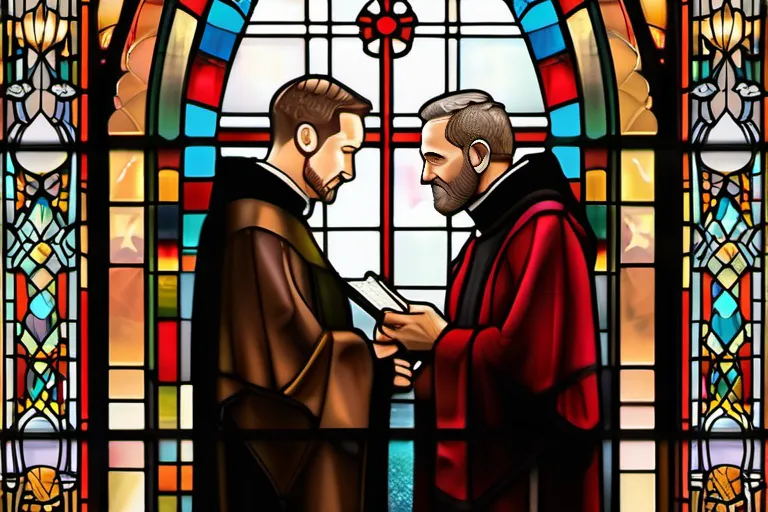Exploring the roles, responsibilities, and distinctions between pastors and priests in Christianity.
In this comprehensive guide, we delve into the intricacies of the roles of pastors and priests within the Christian faith. We will explore their duties, qualifications, and the unique aspects that set them apart.
The Historical Evolution of Pastors and Priests
Imagine traveling back to ancient times, where the roles of pastor and priest were not as clearly defined as they are today. In early Christianity, these titles often overlapped, much like how a single river might split into smaller streams before converging again. Over centuries, however, the paths diverged, creating distinct roles that still echo in our churches today.
Let’s explore the historical origins of pastors and priests. In many early Christian communities, anyone who could read the Bible and lead prayers was essentially a pastor or priest. But as Christianity spread across different regions, cultures, and languages, these roles began to evolve. For example, in Rome during the 3rd century CE, the term ‘priest’ started to denote someone with specific religious duties within the Church structure. Meanwhile, pastors often emerged more from local communities, providing spiritual guidance and support.
The development of Christianity into distinct denominations further refined these roles. In Lutheranism, for instance, the role of a pastor was central to guiding believers in their daily lives with both religious teachings and practical advice. On the other hand, within the Roman Catholic Church, priests took on a more ceremonial role during rituals and ceremonies, while pastors were often seen as community leaders who preached sermons.
As time progressed, these roles continued to evolve. By the 19th century, with the rise of the evangelical movement, the pastor’s role became more focused on preaching and spreading the word of God, often leading large congregations in worship services. Meanwhile, priests in many denominations retained their traditional duties but also took on additional roles such as counseling and administering sacraments.
The journey from one title to another has been marked by change, adaptation, and sometimes controversy. Yet, through it all, the essence of guiding souls towards faith and understanding remained constant. As we look at today’s religious landscape, these historical evolutions continue to shape our understanding of what a pastor or priest truly is.
Do you think the current roles of pastors and priests could change in the future? What new responsibilities might they take on as society evolves?
Qualifications and Training for Pastors and Priests
Understanding the Differences: Pastor vs Priest
When delving into the roles and responsibilities of pastors and priests, it’s essential to explore their distinct qualifications and training. Is a pastor simply someone who leads from the pulpit, or is there more to the role? Similarly, what sets a priest apart in different Christian denominations?
In many ways, both roles are like two sides of the same coin—both ministering souls through faith and love. But let’s consider: do you need a formal education to be a pastor, or can anyone who feels called step up to the task? And what about priests—do they undergo specific theological training that sets them apart?
In Protestant churches, becoming a pastor often involves earning a bachelor’s degree and then pursuing further studies in theology or ministry. Many pastors hold advanced degrees such as Masters of Divinity (M.Div.) or Doctorates in Ministry (D.Min.). These educational paths equip them with the knowledge to lead worship, counsel members, and preach sermons that resonate deeply within their communities.
On the other hand, Catholic priests undergo a more rigorous training process. They typically begin by completing high school and then enter seminary for an additional six or seven years of study. This includes courses in theology, philosophy, and pastoral care. Upon completion, they are ordained as deacons before becoming priests, ensuring they have the necessary theological depth to serve their congregations.
But why does this matter? It matters because it highlights the different emphases each role carries. A pastor’s training might focus more on practical ministry skills and community engagement, whereas a priest’s education often delves deeper into sacramental theology and ecclesiastical law.
In exploring these differences, we see that while both roles serve vital functions within their communities, they do so through unique lenses shaped by varying educational paths. So, the next time you attend church or participate in community activities led by a pastor or priest, remember: behind each title lies a dedicated individual with specific training to fulfill their role.
The Role of Pastors within Christianity
So, what exactly does it mean to be a pastor within Christianity? Let’s dive into the specific duties and responsibilities that define this role. A pastor acts as a spiritual leader, much like a lighthouse guiding ships through stormy seas. In their congregation, they are often seen as the voice of wisdom and guidance, offering support and encouragement in both times of joy and sorrow.
One of the key roles of a pastor is to lead worship services. This involves not just leading hymns and prayers but also creating an atmosphere where people can connect with God. Think about it like conducting a symphony—each member plays their part, but the conductor ensures harmony. Pastors ensure that everyone’s voices are heard in the sanctuary.
Another critical aspect of being a pastor is pastoral care. This involves providing emotional and spiritual support to members of the congregation. It’s akin to being a comforting friend during tough times. Whether it’s counseling someone through personal struggles or offering words of encouragement, pastors serve as a support system for their community. They are there to listen, advise, and offer solace when needed.
Furthermore, pastors often engage in ministry outside the church walls. This might include visiting the sick, organizing community service projects, or participating in interfaith dialogues. These activities extend the reach of the church beyond its physical borders, much like how a tree’s roots stretch deep into the earth while reaching towards the sun.
Lastly, pastors are also teachers and preachers. They deliver sermons that challenge, inspire, and educate their congregation. It’s like planting seeds in fertile soil—pastors sow ideas and values that can grow into strong beliefs and actions among believers. Through regular Bible studies and educational programs, they ensure the spiritual growth of their community.
The Role of Priests within Christianity
When we dive into the world of Christianity, the roles and responsibilities of priests often seem intertwined with those of pastors. But do they really share the same path? Let’s explore the unique journey of priests within their communities.
Imagine a priest as a bridge between God and humanity. In many denominations, such as Roman Catholicism, priests serve as spiritual leaders who perform sacraments like baptism, marriage, and confession. They lead liturgical services and guide the faithful through the sacred rituals that bind them to their faith. How does one become a priest? The process is often rigorous, involving years of seminary education and ordination.
But what sets priests apart from pastors in terms of community impact? In many parishes, priests act as the face of the church. They not only deliver sermons but also provide counseling and support to parishioners facing personal or spiritual crises. Their role extends beyond religious ceremonies; they are often seen as confidants, offering a listening ear and pastoral care.
Consider the metaphor of a doctor in a hospital. Just as doctors treat physical ailments, priests minister to the souls of their congregations. They offer comfort, guidance, and spiritual healing. This dual role requires not only theological knowledge but also emotional intelligence and empathy. How do they balance the need for structured rituals with the personal touch needed during critical moments?
In summary, while both priests and pastors share the common goal of guiding their communities towards faith, priests often have a more defined role in religious ceremonies and community support. Their journey is marked by rigorous training and a commitment to serve as spiritual leaders who bridge the gap between God and the people they lead.
Comparing Pastors and Priests: Key Differences
Comparing Pastors and Priests: Key Differences
Have you ever pondered over the role of pastors and priests in Christianity, wondering what makes one distinct from the other? While both are spiritual leaders, their paths can be as different as night and day. Imagine a pastor as a beacon guiding lost souls through the foggy streets of modern life, and a priest as a seasoned navigator charting safe passages through ancient rituals and traditions. Both play crucial roles but in uniquely different ways.
One key difference lies in their specific denominations. Priests are often seen more commonly within Catholicism, where they hold positions that require ordination by the Church hierarchy. They perform sacraments like baptism, confession, and communion, which are central to Catholic practice. On the other hand, pastors are found across various Protestant denominations, serving primarily as leaders of local congregations. Their roles often revolve around preaching, pastoral care, and community ministry.
The functions they serve within their communities also differ significantly. Priests might be more involved in liturgical ceremonies and sacramental rituals, whereas pastors tend to focus on biblical teaching, counseling, and spiritual guidance. Yet, both are vital for the health of a Christian community, acting as shepherds who guide souls towards righteousness.
It’s interesting to note how their educational backgrounds also shape their roles. Priests typically undergo rigorous training in seminaries and religious institutions before ordination, whereas pastors might have diverse educations ranging from theology to psychology, depending on the needs of their congregation.
In essence, while both share a common goal of leading souls towards Christ, the paths they take are as varied as the communities they serve. Understanding these differences can help us appreciate how each plays a unique and indispensable role in shaping Christian communities across denominations.
The Impact of Pastors and Priests on Christian Communities
The impact of pastors and priests on Christian communities is often like the difference between two powerful lights illuminating different paths in the dark. Both pastors and priests play pivotal roles, but their approaches can be quite distinct. How do they guide their congregations? And what makes them so essential to spiritual growth?
Imagine a pastor as a gardener tending to a vast garden. Each plant represents an individual in the community, with its own unique needs and challenges. The pastor’s role is to ensure that each person receives the right care and attention, guiding them through life’s seasons—sometimes nurturing them during times of joy and sometimes offering comfort during hardships. This approach is often more focused on the pastoral care of individuals, encouraging personal spiritual growth and development.
Now picture a priest as a lighthouse in a stormy sea. Their primary responsibility is to provide a constant beacon of hope and guidance, ensuring that no one strays too far from the path. The priest’s role is more about maintaining order and structure within the community, offering spiritual direction and sacraments. This approach emphasizes communal worship and adherence to religious traditions.
Both roles are vital, much like the interplay between sunlight and shade in a forest. While pastors offer personalized guidance and support, priests ensure that the collective spiritual well-being of the community is maintained. Together, they create an ecosystem where faith flourishes. It’s this combination of individual nurturing and communal unity that makes their contributions so profound.
So, which path do you choose? The one that leads to personal transformation or the one that ensures your place in a vibrant community? Both pastors and priests offer unique perspectives on how to navigate life’s spiritual journey. Their roles might differ, but both aim to guide souls towards divine light and love.
Conclusion
 By the end of this article, you will have a clear understanding of the differences between pastors and priests, and gain insights into the vital roles they play in the Christian community.
By the end of this article, you will have a clear understanding of the differences between pastors and priests, and gain insights into the vital roles they play in the Christian community.











